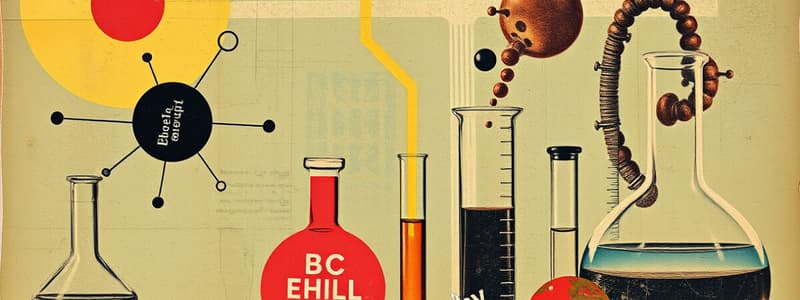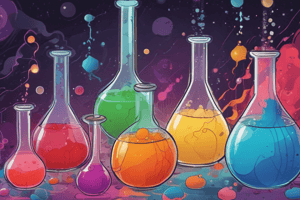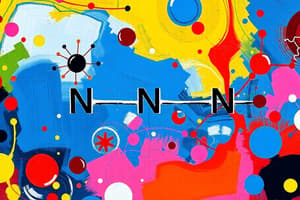Podcast
Questions and Answers
What is a chemical reaction?
What is a chemical reaction?
A process during which chemical bonds between atoms are broken and new ones are formed, producing one or more different substances.
What is a reactant?
What is a reactant?
The starting materials in a chemical reaction.
What is a product?
What is a product?
The new substances that are formed in a chemical reaction.
What is a chemical equation?
What is a chemical equation?
What is a coefficient in a chemical equation?
What is a coefficient in a chemical equation?
What does a subscript indicate in a chemical formula?
What does a subscript indicate in a chemical formula?
What is an exothermic reaction?
What is an exothermic reaction?
What is an endothermic reaction?
What is an endothermic reaction?
What does it mean to balance a chemical equation?
What does it mean to balance a chemical equation?
What is a combustion reaction?
What is a combustion reaction?
What is a synthesis reaction?
What is a synthesis reaction?
What is a decomposition reaction?
What is a decomposition reaction?
What is a single-displacement reaction?
What is a single-displacement reaction?
What is a double-displacement reaction?
What is a double-displacement reaction?
What is a precipitate?
What is a precipitate?
What is oxidation?
What is oxidation?
What is reduction?
What is reduction?
What is an exergonic reaction?
What is an exergonic reaction?
What is an endergonic reaction?
What is an endergonic reaction?
What is a catalyst?
What is a catalyst?
What is an inhibitor?
What is an inhibitor?
What is Scientific Nomenclature?
What is Scientific Nomenclature?
Flashcards are hidden until you start studying
Study Notes
Chemical Reactions Overview
- A chemical reaction involves breaking and forming chemical bonds, resulting in different substances.
- Reactants are the starting materials in these reactions, while products are the new substances formed.
Key Definitions
- Chemical Equation: Symbolic representation of a chemical reaction illustrating the relationship between reactants and products.
- Coefficient: Indicates the number of atoms, molecules, or formula units in a reaction.
- Subscript: Specifies the number of atoms of an element within a molecule or formula unit.
Types of Reactions
- Exothermic Reaction: A reaction that releases energy, often in the form of heat.
- Endothermic Reaction: A reaction that absorbs energy from the surroundings.
Reaction Balancing
- Balancing refers to achieving equality among different elements in a chemical equation.
- Types of visual balance include symmetry, asymmetry, and radial patterns.
Specific Reaction Types
- Combustion Reaction: Occurs when a substance reacts with oxygen, releasing heat and light.
- Synthesis Reaction: Multiple reactants combine to create a single product.
- Decomposition Reaction: A single compound breaks down into two or more simpler substances.
- Single-Displacement Reaction: An element replaces another element within a compound.
- Double-Displacement Reaction: Ions from two compounds exchange to form a gas, solid, or molecular compound.
Chemical Concepts
- Precipitate: A solid formed from a solution during a chemical reaction.
- Oxidation: A chemical change where a substance combines with oxygen, exemplified by rust formation.
- Reduction: Process of adding electrons to an atom or ion, such as removing oxygen or adding hydrogen.
Reaction Energy
- Exergonic Reaction: A spontaneous reaction with a net release of free energy.
- Endergonic Reaction: Absorbs free energy, making it nonspontaneous.
Catalysts and Inhibitors
- Catalyst: A substance that speeds up a reaction without undergoing permanent change.
- Inhibitor: A material that slows down the rate of a chemical reaction.
Scientific Nomenclature
- Developed by Carlos Linnaeus, this system assigns each organism a two-part name, consisting of its genus and species.
Studying That Suits You
Use AI to generate personalized quizzes and flashcards to suit your learning preferences.




